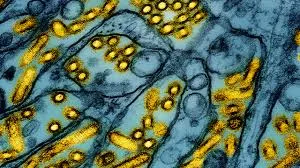The first human death from bird flu in the United States has heightened calls for the government to step up its efforts to prevent a potential pandemic, particularly as Donald Trump’s return to the White House looms.
Health experts have been urging U.S. authorities for months to increase surveillance and share more information about the ongoing bird flu outbreak, especially after the virus began spreading among dairy cows for the first time.
On Monday, Louisiana health authorities reported that a patient over the age of 60 had died from avian influenza, marking the country’s first bird flu-related death. The individual, who had underlying medical conditions, contracted the virus after exposure to infected birds.
While the World Health Organization (WHO) has consistently stated that the general risk to the public remains low and there is no evidence of human-to-human transmission, experts have raised concerns about the virus’s potential to evolve into a more contagious form capable of spreading among people.
“The problem is that this is how it could start,” said Marion Koopmans, a virologist at Erasmus University Medical Center in the Netherlands. She also criticized the lack of containment efforts regarding the bird flu outbreak among cattle in the U.S.
Since the beginning of 2023, the U.S. has recorded 66 human cases of bird flu, mostly among farm workers, with the Louisiana death marking the first fatality. Nearly half of the 954 human cases of H5N1 recorded globally since 2003 have been fatal, according to WHO data.
Experts warn that the bird flu strain H5N1, first identified in 1996, has evolved over the years, with millions of birds dying in a record global outbreak since 2020. In March 2024, the virus was detected spreading between dairy cows in the U.S. The virus has shown signs of mutating in mammals, which could increase its ability to infect humans.
Jennifer Nuzzo, a professor of epidemiology at Brown University, stated that the first human death should serve as a wake-up call, especially after months of experts urging the U.S. government to take stronger action.
Virologist Tom Peacock from Imperial College London also expressed concern, saying that governments should put more pressure on the U.S. to contain the H5N1 outbreak in cattle. Peacock co-authored a preprint study that suggests the mutations in the H5N1 strain are enhancing its ability to infect mammals, including humans.
The U.S. government has responded by investing an additional $306 million in H5N1 surveillance and research programs. However, experts like Rick Bright, a former senior U.S. health official, are calling for greater transparency and the release of more data on bird flu infections in animals. Bright also advocated for making H5N1 vaccine doses available to at-risk individuals, such as farm workers.
With Trump set to replace President Biden in less than two weeks, some experts are calling for swift action to address the growing threat of bird flu, particularly with concerns over Trump’s health secretary nominee, Robert F. Kennedy Jr., who is known for his vaccine skepticism. There are also concerns over the safety of raw milk, which has been found to contain bird flu from infected dairy cows, a concern given Kennedy’s public support for raw milk consumption.
The situation remains fluid, and many are urging U.S. authorities to act quickly to contain the outbreak before it escalates into a broader public health crisis.
AFP


